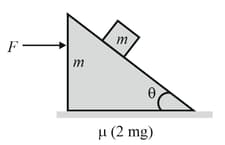Three blocks are connected as shown in the figure. Calculate the minimum force required to move the body with constant velocity. The coefficient of friction at all surfaces is .
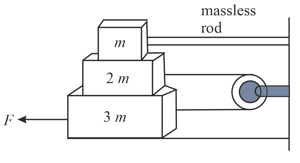
[Assume that rod does not exert force in the vertical direction]


Important Questions on Newton's Laws of Motion II
The three flat blocks in the figure, are positioned on the incline and a force parallel to the inclined plane is applied to the middle block. The upper block is prevented from moving by a wire which attaches it to the fixed support. The masses of the three blocks in and coefficient of static friction for each of the three pairs of contact surfaces are shown in the figure. Determine the maximum value which force may have before the slipping take place anywhere.
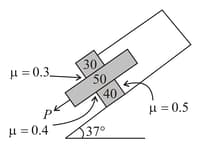
Block of mass rests on block of mass . All surfaces are rough with the value of coefficient of friction, as shown in the figure. Find the minimum force that should be applied on block to cause relative motion between and .

Two blocks and are as shown in the figure. The minimum horizontal force applied on the block for which slipping begins at and ground is:
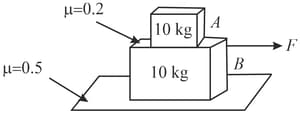
In the given diagram, what is the minimum value of a horizontal external force on the block so that block will slide on the ground?
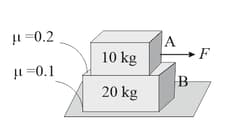
In the given diagram, what is the minimum value of a horizontal external force on the block so that block will slide on the ground?
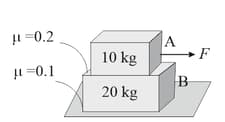
Two blocks and are connected by a string passing over a smooth pulley as shown in the figure. rests on a rough horizontal surface and rests on . The coefficient of friction between and is the same as that between and the horizontal surface. The minimum horizontal force required to move to the left is The coefficient of friction is

In the situation shown in the figure, a wedge of mass is placed on a rough surface, on which a block of equal mass is placed on the inclined plane of wedge. Friction coefficient between plane and the block and the ground and the wedge . An external force is applied horizontally on the wedge. Given that does not slide on incline due to its weight. The value of at which wedge will start slipping is
